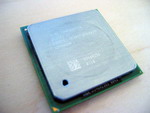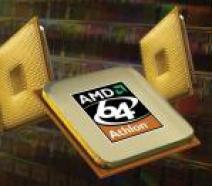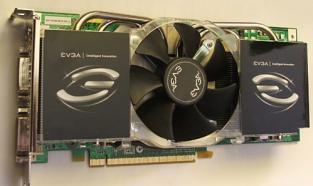OOPS! You forgot to upload swfobject.js ! You must upload this file for your form to work.
MCP89 last NVIDIA chipset for Intel platform
![]()
|
xtreview is your : Video card - cpu - memory - Hard drive - power supply unit source |
|
|||
|
|
||||
 Recommended : Free unlimited image hosting with image editor
Recommended : Free unlimited image hosting with image editor
|
POSTER: computer news || MCP89 LAST NVIDIA CHIPSET FOR INTEL PLATFORM |
DATE:2010-02-19 |
|
|
We already reported about the inevitable disappearance of independent chipset producers, since the functions of the north bridge gradually pass to the central processor, but the functionality of the south bridge with the selection of the platform usually does not play a decisive role - motherboard producer easily realizes the missing possibilities with the aid of the additional controllers. With the transfer in the central processor of graphic system expedience for the release of NVIDIA integrated chipset is reduced, since the speed of integrated graphic core was the strong side of this producer. However, there still one obstacle - NVIDIA company does not own license to the production of chipsets for Intel processors with the built-in memory controller. NVIDIA representatives attempted to preserve optimism apropos of future for their business on the production of chipset. First, the management of the company declared about the intentions to continue the release of chipset for LGA 775 platform for long. In the first quarter 2010 was promised the announcement of chipset MCP89, whose graphic system will allow systems on base of core 2 Duo processors to go around on the speed level with the heavy stock of arrandale and Clarkdale processors with the built-in graphic core. Furthermore, NVIDIA relies on victory in the judicial dispute with Intel around the DMI bus. At the yesterday's quarterly current conference NVIDIA chapter expressed confidence that the company business for the production of chipset will demonstrate good financial results, also, in this year. Mr. Dzhensen Juan acknowledged that the company gradually will move from the production of integrated chipset, and MCP89 will become the last chipset for Intel platform. The production of chipset will be achieved on 40 nm technology. In the opinion of NVIDIA chapter, ION platform holds a durable position in the segment of elite netbook, which will correspond to 10-25% of market. In the second place, the technology optimus in the mobile segment will allow NVIDIA to compensate failure of chipset production. | ||
|
|
||
|
xtreview is your : Video card - cpu - memory - Hard drive - power supply unit source |
|
|
|
|
||
|
Xtreview Support  N-Post:xxxx Xtreview Support        |
MCP89 LAST NVIDIA CHIPSET FOR INTEL PLATFORM |
| Please Feel Free to write any Comment; Thanks  |
|
XT Future Member  N-Post:  |
MCP89 LAST NVIDIA CHIPSET FOR INTEL PLATFORM |
thanks was looking to upgrade my mcp79 so this will hopefully be what i\'m looking for! looking forward to hearing more details |
The last quarter for the company Sony was successful (2017-08-03)
Last quarter, WDC beat its competitor by the number of hard drives delivered (2017-07-31)
Last week, the value of NVIDIAs capitalization reached a five-year high (2017-06-12)
Premier in the AMD Vega family will last to 2018 (2017-05-19)
The number of exchanged old iPhone for a new one in the last six months reached record values (2017-05-03)
Last year, part of AMDs graphics solutions produced GlobalFoundries (2017-04-30)
Last year, AMD received 78 percents of revenue outside the US (2017-04-30)
System requirements horror Outlast 2 were surprisingly low (2017-04-20)
Protection Denuvo in Mass Effect Andromeda did not last two weeks (2017-04-05)
SSD-novelties of last week ADATA, Transcend, Palit (2017-04-03)
The alignment of forces in the automotive microelectronics segment did not change last year (2017-03-29)
Kingston Digital last year occupied 16 percents of the retail SSD market (2017-03-21)
Thanks to Overwatch holding Activision Blizzard received a record revenue last year (2017-02-13)
Last quarter, Apple sold 78.3 million iPhone and received a record revenue (2017-02-01)
In the last half of the years Russians are willing to buy laptops (2017-01-19)
Samsung Electronics Revenue in the fourth quarter was a record for the last three years (2017-01-07)
For DOOM came last net addition (2016-12-15)
PS4 can not cope with The Last Guardian in general, and PS4 Pro - in 4K (2016-12-06)
Mazda will teach future electric cars ride with the last effort (2016-11-18)
Epic unfinished The Last Guardian sent to print (2016-10-24)
![]()
To figure out your best laptops .Welcome to XTreview.com. Here u can find a complete computer hardware guide and laptop rating .More than 500 reviews of modern PC to understand the basic architecture


7600gt review
7600gt is the middle card range.
We already benchmarked this video card and found that ...

 geforce 8800gtx and 8800gts
geforce 8800gtx and 8800gts  Xtreview software download Section
Xtreview software download Section  AMD TURION 64 X2 REVIEW
AMD TURION 64 X2 REVIEW  INTEL PENTIUM D 920 , INTEL PENTIUM D 930
INTEL PENTIUM D 920 , INTEL PENTIUM D 930  6800XT REVIEW
6800XT REVIEW  computer hardware REVIEW
computer hardware REVIEW  INTEL CONROE CORE DUO 2 REVIEW VS AMD AM2
INTEL CONROE CORE DUO 2 REVIEW VS AMD AM2  INTEL PENTIUM D 805 INTEL D805
INTEL PENTIUM D 805 INTEL D805  Free desktop wallpaper
Free desktop wallpaper  online fighting game
online fighting game  Xtreview price comparison center
Xtreview price comparison center Lastest 15 Reviews


Rss Feeds
Last News
- The new version of GPU-Z finally kills the belief in the miracle of Vega transformation
- The motherboard manufacturer confirms the characteristics of the processors Coffee Lake
- We are looking for copper coolers on NVIDIA Volta computing accelerators
- Unofficially about Intels plans to release 300-series chipset
- The Japanese representation of AMD offered monetary compensation to the first buyers of Ryzen Threadripper
- This year will not be released more than 45 million motherboards
- TSMC denies the presentation of charges from the antimonopoly authorities
- Radeon RX Vega 64 at frequencies 1802-1000 MHz updated the record GPUPI 1B
- AMD itself would like to believe that mobile processors Ryzen have already been released
- AMD Vega 20 will find application in accelerating computations
- Pre-orders for new iPhone start next week
- Radeon RX Vega 57, 58 and 59: the wonders of transformation
- ASML starts commercial delivery of EUV-scanners
- The older Skylake processors with a free multiplier are removed from production
- Meizu will release Android-smartphone based on Helio P40
- AMD Bristol Ridge processors are also available in American retail
- The fate of Toshiba Memory can be solved to the next environment
- duo GeForce GTX 1080 Ti in GPUPI 1B at frequencies of 2480-10320 MHz
- New Kentsfield overclocking record up to 5204 MHz
- Lenovo released Android-smartphone K8

HALO 3 HALO 3 - Final Fight!

PREY Prey is something you don t often see anymore: a totally unigue shooter experience.

computer news computer parts review Old Forum Downloads New Forum Login Join Articles terms Hardware blog Sitemap Get Freebies


